Clean Energy for All with Stand-alone Solar Power Generation System “Power Supply Station”
Clean Energy for All with Stand-alone Solar Power Generation System “Power Supply Station”
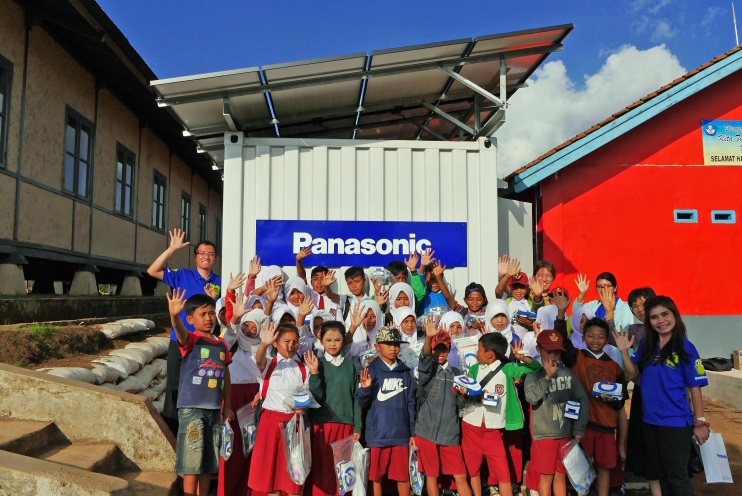
An elementary school in the village of Banjarsari, West Java Province, Indonesia
An elementary school in the village of Banjarsari, West Java Province, Indonesia
An elementary school in an isolated mountainous region on a remote Indonesian island turned on the lights for the first time. The children can now clearly see the blackboard and their textbooks, and they can learn using digital equipment. They actively engage in their studies. The Power Supply Station—Panasonic's stand-alone power generation package that uses solar panels and storage batteries—is providing power to Southeast Asian regions where the electricity infrastructure is not yet in place. It not only provides clean energy but also generates improvements in education, health care, and the quality of life.
An elementary school in an isolated mountainous region on a remote Indonesian island turned on the lights for the first time. The children can now clearly see the blackboard and their textbooks, and they can learn using digital equipment. They actively engage in their studies. The Power Supply Station—Panasonic's stand-alone power generation package that uses solar panels and storage batteries—is providing power to Southeast Asian regions where the electricity infrastructure is not yet in place. It not only provides clean energy but also generates improvements in education, health care, and the quality of life.
Contributions to Sustainable Development Goals (SDGs)
Contributions to Sustainable Development Goals (SDGs)
![]()

Goal 7: Affordable and clean energy
In countries and regions in which supplying electricity is difficult, Panasonic is installing the Power Supply Station—compactly packaged photovoltaic and electricity storage system—to create an environment in which everyone can access clean energy.
Goal 7: Affordable and clean energy
In countries and regions in which supplying electricity is difficult, Panasonic is installing the Power Supply Station—compactly packaged photovoltaic and electricity storage system—to create an environment in which everyone can access clean energy.
Other Related SDGs
Other Related SDGs






Delivering power to 1.1 billion people who have no access to electricity, and generating new value at the community level
Delivering power to 1.1 billion people who have no access to electricity, and generating new value at the community level
Worldwide, there are approximately 1.1 billion people who have no access to electricity. Roughly 400 million people in Asia and 600 million in Africa live their lives without electric power. Regions without electricity face various challenges. For instance, kerosene lamps, which are often used in place of electric lights, emit carbon dioxide and can cause fires, and their smoke causes health problems. The high cost of fuel also puts pressure on family budgets. Despite these challenges, people use them for light.
Panasonic's Eco Solutions Company hopes that by delivering clean energy to these regions it can create value through improvements in the quality of life, create more education opportunities, create jobs, improve economic capacity, and revitalize communities, thereby contributing to the creation of sustainable local communities. The Company launched this project in 2012, and by leveraging Panasonic's solar power generation and storage technologies, it began developing power generation equipment that is easy to transport and install in any environment. Then, in 2014, it created the Power Supply Station (PSS).
The PSS is a stand-alone power generation system that combines a storage battery (total capacity 17 kWh) with the highly efficient solar battery panel HIT® (maximum power generation capacity of 3 kW). The main unit is enclosed in a steel cabinet after undergoing quality assurance at a Panasonic factory, so the PSS is extremely compact and laborsaving in its transport and installation. The installed power supply management system monitors the storage levels and controls the amount of power supplied, so it requires less on-site maintenance and management, making it easy to use even in mountainous areas, on remote islands, and in other inaccessible regions. Panasonic has already introduced the PSS in Indonesia and Myanmar, and it is taking a trial-and-error approach in assessing the state of its required performance and equipment, how to install and manage the PSS, and how to build relationships with local communities, all while taking into account the specific needs and issues facing these varied regions.
Worldwide, there are approximately 1.1 billion people who have no access to electricity. Roughly 400 million people in Asia and 600 million in Africa live their lives without electric power. Regions without electricity face various challenges. For instance, kerosene lamps, which are often used in place of electric lights, emit carbon dioxide and can cause fires, and their smoke causes health problems. The high cost of fuel also puts pressure on family budgets. Despite these challenges, people use them for light.
Panasonic's Eco Solutions Company hopes that by delivering clean energy to these regions it can create value through improvements in the quality of life, create more education opportunities, create jobs, improve economic capacity, and revitalize communities, thereby contributing to the creation of sustainable local communities. The Company launched this project in 2012, and by leveraging Panasonic's solar power generation and storage technologies, it began developing power generation equipment that is easy to transport and install in any environment. Then, in 2014, it created the Power Supply Station (PSS).
The PSS is a stand-alone power generation system that combines a storage battery (total capacity 17 kWh) with the highly efficient solar battery panel HIT® (maximum power generation capacity of 3 kW). The main unit is enclosed in a steel cabinet after undergoing quality assurance at a Panasonic factory, so the PSS is extremely compact and laborsaving in its transport and installation. The installed power supply management system monitors the storage levels and controls the amount of power supplied, so it requires less on-site maintenance and management, making it easy to use even in mountainous areas, on remote islands, and in other inaccessible regions. Panasonic has already introduced the PSS in Indonesia and Myanmar, and it is taking a trial-and-error approach in assessing the state of its required performance and equipment, how to install and manage the PSS, and how to build relationships with local communities, all while taking into account the specific needs and issues facing these varied regions.
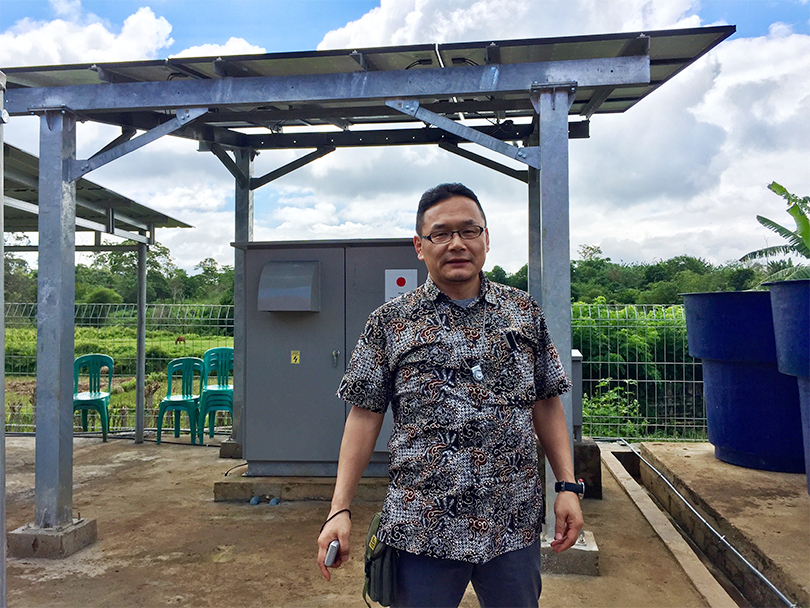
Masakazu Yamamoto, Manager, Power Components Business Unit, Energy Systems Business Division, Eco Solutions Company
Masakazu Yamamoto, Manager, Power Components Business Unit, Energy Systems Business Division, Eco Solutions Company
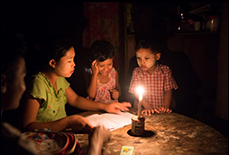
Children of Myanmar studying with the light of a kerosene lamp
Children of Myanmar studying with the light of a kerosene lamp
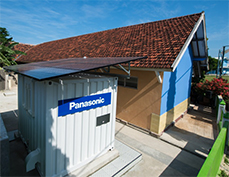
An elementary school in Karimunjawa Island, Central Java Province, Indonesia
An elementary school in Karimunjawa Island, Central Java Province, Indonesia
Educational, Medical, and Lifestyle Changes in Villages in Indonesia and Myanmar
Educational, Medical, and Lifestyle Changes in Villages in Indonesia and Myanmar
Indonesia—one of the nations in which the PSS business is underway—is comprised of more than 13,000 islands. As of 2016, 9% of its population did not have access to electricity, and people living on remote islands or in mountainous regions face various challenges due to this lack of access. In fiscal 2015, PSS projects were adopted by the Embassy of Japan in Indonesia for the Grant Assistance for Grass-Roots Human Security Projects (ODA projects). Since then, Panasonic has been deploying the PSS in locations in four different regions.
One of these locations is Rarak-Rongis, a village on Sumbawa island that struggled with the challenges of obtaining access to electricity and clean water. The well water in the village was of poor quality, and the wells had even run dry, so the village was unable to stably secure water. The only power in the village was irregularly supplied through a diesel generator, but with PSS solar power generation, the village was able to run their Clean Water Supply System, which is a water purification system made by Yamaha Motor Co., Ltd.. This gave the villagers access clean water any time. The village’s water management association also plans to sell clean water to surrounding areas, which promises to lead to a source of income and maintenance funds for the village.
Indonesia—one of the nations in which the PSS business is underway—is comprised of more than 13,000 islands. As of 2016, 9% of its population did not have access to electricity, and people living on remote islands or in mountainous regions face various challenges due to this lack of access. In fiscal 2015, PSS projects were adopted by the Embassy of Japan in Indonesia for the Grant Assistance for Grass-Roots Human Security Projects (ODA projects). Since then, Panasonic has been deploying the PSS in locations in four different regions.
One of these locations is Rarak-Rongis, a village on Sumbawa island that struggled with the challenges of obtaining access to electricity and clean water. The well water in the village was of poor quality, and the wells had even run dry, so the village was unable to stably secure water. The only power in the village was irregularly supplied through a diesel generator, but with PSS solar power generation, the village was able to run their Clean Water Supply System, which is a water purification system made by Yamaha Motor Co., Ltd.. This gave the villagers access clean water any time. The village’s water management association also plans to sell clean water to surrounding areas, which promises to lead to a source of income and maintenance funds for the village.
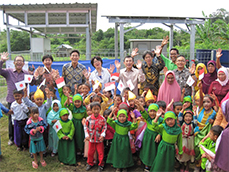
Delivering clean drinking water and electricity to the village of Rarak-Rongis
Delivering clean drinking water and electricity to the village of Rarak-Rongis
In Myanmar, another of the project's target areas, it is said that approximately 68% of the population has no electricity, the highest figure among ASEAN nations. In Yin Ma Chaung village, which had no electricity, Panasonic introduced the PSS in collaboration with Thailand's MFL Foundation, which is working to support quality-of-life improvements. This project was made possible through a donation from Mitsui & Co., which approved the goals of the MFL Foundation’s activities.
Yin Ma Chaung is a settlement of roughly 140 households located in central Myanmar. This region is inhabited by Russell's vipers, known for their lethal venom, and there are frequent reports of poisonous snake bites . These often occur when people are walking at night, and many of the injured are unable to walk or even die. The PSS allowed the village to power LED street lamps, making it safer to walk at night. The village is now also able to store poisonous viper serum in its refrigerators and provide it to its residents and those of the surrounding villages, raising the level of security of the entire region.
In Myanmar, another of the project's target areas, it is said that approximately 68% of the population has no electricity, the highest figure among ASEAN nations. In Yin Ma Chaung village, which had no electricity, Panasonic introduced the PSS in collaboration with Thailand's MFL Foundation, which is working to support quality-of-life improvements. This project was made possible through a donation from Mitsui & Co., which approved the goals of the MFL Foundation’s activities.
Yin Ma Chaung is a settlement of roughly 140 households located in central Myanmar. This region is inhabited by Russell's vipers, known for their lethal venom, and there are frequent reports of poisonous snake bites . These often occur when people are walking at night, and many of the injured are unable to walk or even die. The PSS allowed the village to power LED street lamps, making it safer to walk at night. The village is now also able to store poisonous viper serum in its refrigerators and provide it to its residents and those of the surrounding villages, raising the level of security of the entire region.
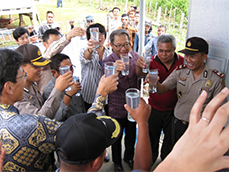
A toast with clean water from the purification system thanks to the PSS
A toast with clean water from the purification system thanks to the PSS
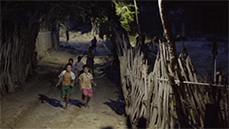
Turning on the lights in Myanmar's Yin Ma Chaung village
Turning on the lights in Myanmar's Yin Ma Chaung village
The Key is in Sustainable Initiatives and Approaches Tailored to Each Region
The Key is in Sustainable Initiatives and Approaches Tailored to Each Region
When delivering power to the various regions of the world, we must carefully consider the local environment, its geographical features, and various conditions, including transport and installation. For instance, the method of transport will differ for an island nation, like Indonesia, than for a continent, like Africa. Furthermore, in countries that have not made much progress in electricity infrastructure, the awareness of and knowledge about the convenience and use of electricity will be lower than that of countries that have made relatively good progress. There are significant risks in using electricity without knowing anything about it.
We have had such experiences in the regions that were used for trial installations of the PSS. When visiting a village that had no electricity one month after the PSS was installed, there was an increase in electric fans and lights throughout the village. The villagers were even using household storage batteries and storing electricity without permission. This resulted in usage levels far beyond expectations, which led to a system shutdown. We had initially explained the usage levels and how to use the system, but it appeared that we needed to be even more careful.
Providing electricity is not as simple as just delivering a product. It starts with area surveys and communicating with the locals before installation, and with follow-up checks thereafter. It requires continuous activity over a very long time span. This is why it is important to build strong ties to local communities through cooperation with NGOs, NPOs, the Japanese embassy, and the system integrators that will take care of the technical matters. By working with on-site partners, we can communicate better with local people. We can work together to consider the issues and their solutions, develop effective approaches and systems, and provide technical support that is closely tied to the community.
When delivering power to the various regions of the world, we must carefully consider the local environment, its geographical features, and various conditions, including transport and installation. For instance, the method of transport will differ for an island nation, like Indonesia, than for a continent, like Africa. Furthermore, in countries that have not made much progress in electricity infrastructure, the awareness of and knowledge about the convenience and use of electricity will be lower than that of countries that have made relatively good progress. There are significant risks in using electricity without knowing anything about it.
We have had such experiences in the regions that were used for trial installations of the PSS. When visiting a village that had no electricity one month after the PSS was installed, there was an increase in electric fans and lights throughout the village. The villagers were even using household storage batteries and storing electricity without permission. This resulted in usage levels far beyond expectations, which led to a system shutdown. We had initially explained the usage levels and how to use the system, but it appeared that we needed to be even more careful.
Providing electricity is not as simple as just delivering a product. It starts with area surveys and communicating with the locals before installation, and with follow-up checks thereafter. It requires continuous activity over a very long time span. This is why it is important to build strong ties to local communities through cooperation with NGOs, NPOs, the Japanese embassy, and the system integrators that will take care of the technical matters. By working with on-site partners, we can communicate better with local people. We can work together to consider the issues and their solutions, develop effective approaches and systems, and provide technical support that is closely tied to the community.
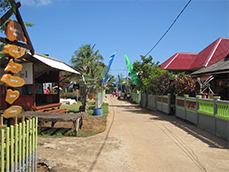
A village in Wakatobi islands, Southeast Sulawesi, Indonesia
A village in Wakatobi islands, Southeast Sulawesi, Indonesia
Solving Social Issues and Expanding Our Business: The Effects and Challenges of the PSS Business
Solving Social Issues and Expanding Our Business: The Effects and Challenges of the PSS Business
The PSS business—driven by the idea of delivering clean energy to the whole world—is certainly an initiative for realizing Goal #7 of the Sustainable Development Goals (SDGs): affordable and clean energy. In addition, by making electricity accessible, the project leads to improvements in access to education, health care, and safe water, thereby contributing to other SDGs. In the long term, Panasonic believes it is possible that the use of the PSS could lead to the cultivation of industry and eradication of poverty.
In addition to solving social issues, the project also has a positive effect on Panasonic's business. For example, Panasonic has been involved in the solar panel sales business in Indonesia for some time, but the PSS project has improved our brand image and made our advertising more effective. The PSS was built to monitor and gather data on the amount of power generated and used, so it has been useful in product development and marketing, as we have gathered and analyzed data related to storage battery consumption, product life spans, and maintenance.
However, the project has also seen its share of challenges. The strength of the PSS is its compact size. Nevertheless, it weighs a total of one tonne, so we would like to break it up further in the pursuit of an even more compact size. Moreover, while its package design and on-site ease-of-installation are very attractive, users can only begin to use it once installation is complete. To differentiate it from conventional products that are brought in in separate modules and assembled on-site, we plan to improve the PSS's performance as a complete product.
The PSS business—driven by the idea of delivering clean energy to the whole world—is certainly an initiative for realizing Goal #7 of the Sustainable Development Goals (SDGs): affordable and clean energy. In addition, by making electricity accessible, the project leads to improvements in access to education, health care, and safe water, thereby contributing to other SDGs. In the long term, Panasonic believes it is possible that the use of the PSS could lead to the cultivation of industry and eradication of poverty.
In addition to solving social issues, the project also has a positive effect on Panasonic's business. For example, Panasonic has been involved in the solar panel sales business in Indonesia for some time, but the PSS project has improved our brand image and made our advertising more effective. The PSS was built to monitor and gather data on the amount of power generated and used, so it has been useful in product development and marketing, as we have gathered and analyzed data related to storage battery consumption, product life spans, and maintenance.
However, the project has also seen its share of challenges. The strength of the PSS is its compact size. Nevertheless, it weighs a total of one tonne, so we would like to break it up further in the pursuit of an even more compact size. Moreover, while its package design and on-site ease-of-installation are very attractive, users can only begin to use it once installation is complete. To differentiate it from conventional products that are brought in in separate modules and assembled on-site, we plan to improve the PSS's performance as a complete product.
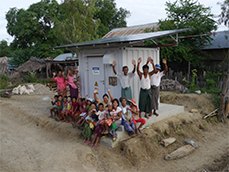
Yin Ma Chaung village, Myanmar
Yin Ma Chaung village, Myanmar
To All Regions with Electric Power Challenges: Spreading Ideas and Nurturing Promising Industries
To All Regions with Electric Power Challenges: Spreading Ideas and Nurturing Promising Industries
While promoting the PSS business, we have found new needs and ideas related to how electricity is used. People living in the project areas have shared their opinions, including one suggestion regarding using machines to dry and apply heat treatment to harvested agriculture and marine products. Furthermore, tourism companies, banks, and other service providers want to grow their businesses in these regions, but they often face challenges with power generation. We are currently approaching various business users while pondering the applicability of sixth-sector industrialization in these regions, or even larger industrial applications. Besides regions without electricity and poor areas, there are regions that have challenges even though they have electricity. The PSS can certainly contribute to these regions, either as a renewable energy power generation system or as a system for stabilizing the electric power supply. We would like to approach a wide range of regions facing electric power issues.
To expand this project into various locations, it is vital that we accurately assess conditions and needs in each location and remember to continually follow up with all relevant parties. We would also like to pick up new ideas about how to use electricity in each of the regions we serve. For this reason, we need to have a structure that allows us to strengthen relations with NGOs, NPOs, system integrators, and other local partners, and to transfer the control of operations to these partners.
The PSS is a solution that can dramatically contribute to the increased access to electricity, thanks to its compact size and its ease of transport. We would like to make it a complete product by considering how to make it smaller and how to apply lithium-ion batteries. There are still hurdles to overcome in terms of improving technology, establishing business models, and investing capital, but we would like to expand our vision beyond Asia and to Africa and the rest of the world.
In addition to the PSS business activities discussed here, Panasonic launched its Off-Grid Solutions Project as a part of its corporate citizenship activities, in celebration of the 100th anniversary of the company’s founding in 2018. Through this project, Panasonic is working to raise awareness, provide education, and develop human resources, all related to electricity, while donating solar power generation and storage systems to regions throughout the world that do not have electricity.
While promoting the PSS business, we have found new needs and ideas related to how electricity is used. People living in the project areas have shared their opinions, including one suggestion regarding using machines to dry and apply heat treatment to harvested agriculture and marine products. Furthermore, tourism companies, banks, and other service providers want to grow their businesses in these regions, but they often face challenges with power generation. We are currently approaching various business users while pondering the applicability of sixth-sector industrialization in these regions, or even larger industrial applications. Besides regions without electricity and poor areas, there are regions that have challenges even though they have electricity. The PSS can certainly contribute to these regions, either as a renewable energy power generation system or as a system for stabilizing the electric power supply. We would like to approach a wide range of regions facing electric power issues.
To expand this project into various locations, it is vital that we accurately assess conditions and needs in each location and remember to continually follow up with all relevant parties. We would also like to pick up new ideas about how to use electricity in each of the regions we serve. For this reason, we need to have a structure that allows us to strengthen relations with NGOs, NPOs, system integrators, and other local partners, and to transfer the control of operations to these partners.
The PSS is a solution that can dramatically contribute to the increased access to electricity, thanks to its compact size and its ease of transport. We would like to make it a complete product by considering how to make it smaller and how to apply lithium-ion batteries. There are still hurdles to overcome in terms of improving technology, establishing business models, and investing capital, but we would like to expand our vision beyond Asia and to Africa and the rest of the world.
In addition to the PSS business activities discussed here, Panasonic launched its Off-Grid Solutions Project as a part of its corporate citizenship activities, in celebration of the 100th anniversary of the company’s founding in 2018. Through this project, Panasonic is working to raise awareness, provide education, and develop human resources, all related to electricity, while donating solar power generation and storage systems to regions throughout the world that do not have electricity.
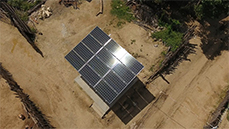
Yin Ma Chaung village, Myanmar
Yin Ma Chaung village, Myanmar

